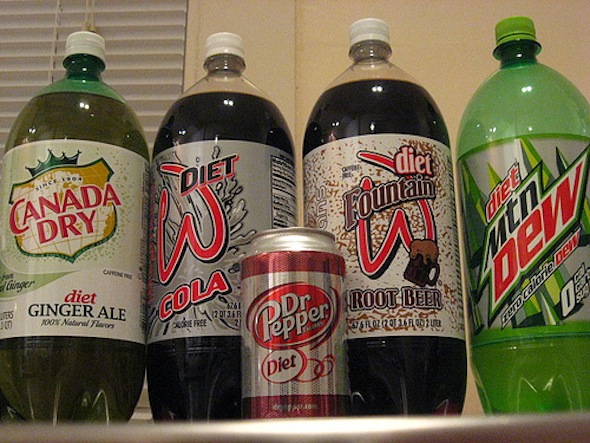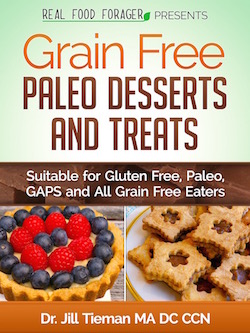In a recently published article in the Journal of General Internal Medicine, researchers concluded that daily consumption of diet soft drinks is associated with an increased risk for vascular events like stroke. The investigators cite the need for further research before drawing any conclusions about diet soft drink consumption. Personally, I don’t need, and have never needed any research to convince me to NEVER drink any soda, especially diet sodas. However, I have some dear friends who still persist in drinking these dangerous drinks and I hope to share this with them.
Researchers from the University of Miami Miller School of Medicine and the Columbia University Medical Center examined the soda drinking habits of 2,564 people who participated in the Northern Manhattan Study over a 10-year period.
Diet soda drinkers found to have a 43 % higher risk of having a vascular event
The researchers found that people who reported drinking diet soda on a daily basis had a 43 percent higher risk of having a vascular event than people who didn’t drink any soda, even after controlling for metabolic syndrome, peripheral vascular disease, diabetes, cardiac disease, hypertension, and hypercholesterolemia. People who drank regular soda didn’t have the increased risk.
Study researcher Hannah Gardener ScD, an epidemiologist from the University of Miami Miller School of Medicine in Florida, previously presented these findings at the International Stroke Conference of 2011.
Artificial sweeteners found to be addictive
Government surveys have found that people who drink diet beverages average more than 26 ounces per day. That’s more than four 8 ounce cans of soda a day and some drink far more. They also found that 3% of diet soda drinkers have at least four cans daily.
Is it the caffeine that is so compelling? That doesn’t explain it, because many diet soda drinkers prefer the caffeine-free varieties.
Experts say that the rituals around diet soda and the artificial sweeteners it contains can make some people psychologically — and even physically — dependent on it in ways that mimic more serious addictions. Because immediate weight gain is not experienced, it allows drinkers to continue drinking without apparent consequence.
Research suggests that the artificial sweeteners in diet soda (such as aspartame, saccharin, Splenda, etc.) may prompt people to drink cup after cup, because these fake sugars don’t satisfy like the real thing.
In a 2008 study involving human taste pathways in the brain, women who drank water that was alternately sweetened with sugar and Splenda couldn’t tell the difference — but their brains could. Functional MRI brain scans revealed that even though both drinks lit up the brain’s reward system, the sugar did so more completely.
Artificial sweeteners may spur drinkers — or their brains — to keep chasing a “high” that diet soda keeps just out of reach. It’s not clear that this teasing effect can lead to dependence, but it’s a possibility. Dr. Martin P. Paulus, M.D., a professor of psychiatry at the University of California San Diego, and one of the authors of the study said,
Artificial sweeteners have positive reinforcing effects — meaning humans will work for it, like for other foods, alcohol, and even drugs of abuse…Whenever you have that, there is a potential that a subgroup of people… will have a chance of getting addicted.
According to the American Psychiatric Association, a key sign of dependence is when a person continues to use a substance even when he or she knows it’s causing physical or mental health problems.
Diet soda has been linked to osteoporosis (the phosphoric acid in soda — both diet and regular — leaches calcium from bones, which can make osteoporosis worse.) Additionally, habitual diet soda consumption has been linked to type 2 diabetes, weight gain and now stroke.
Another distinguishing feature of substance dependence — whether it’s to caffeine, nicotine, or hard drugs like heroin — is the painful withdrawal symptoms that occur if a person tries to quit cold turkey. Although it’s difficult to pinpoint whether aspartame or other artificial sweeteners, caffeine, or some combination of ingredients is responsible, people who cut back on diet soda report symptoms such as headaches, nausea, and irritability.
Scientific evidence shows that people who have an addictive personality are also susceptible to sugary foods.
A report published in the Journal of Psychoactive Drugs in June, 2010 illustrated that many studies have shown that a high number of alcohol-dependent and other drug-dependent individuals have a sweet preference, especially for foods with a high sucrose concentration (refined white sugar).
Human and animal studies have shown that in some brains, the consumption of sugar-rich foods or drinks precipitates the release of euphoric endorphins and dopamine (the feel good chemicals) within the nucleus accumbens, in a manner similar to the response to some recreational drugs. Scientists have found that the brain pathways of drug and sugar addiction involve similar neural receptors and neurotransmitters. Using functional MRI of the brain, there has been visual documentation of craving, tolerance, withdrawal and sensitization in specific areas in the brain.
Furthermore, there appears to be cross sensitization between sugar addiction and narcotic dependence in some individuals. In the last two decades research has noted that specific genes may underlie the sweet preference in alcohol- and drug-dependent individuals, as well as in biological children of paternal alcoholics.
While the urge to consume food or drinks with artificial sweeteners may be part of a cycle of addiction, the ultimate satisfaction is elusive, because it is not the real thing and this leads the person to crave more.
Weight gain from artificial sweeteners
A Purdue University study published in the journal Behavioral Neuroscience in 2008, reported that rats on diets containing the artificial sweetener saccharin gained more weight than rats given sugary food. Researchers Swithers, and Davidson
… found that reducing the correlation between sweet taste and the caloric content of foods using artificial sweeteners in rats resulted in increased caloric intake, increased body weight, and increased adiposity, as well as diminished caloric compensation and blunted thermic responses to sweet-tasting diets. These results suggest that consumption of products containing artificial sweeteners may lead to increased body weight and obesity by interfering with fundamental homeostatic, physiological processes.
Clearly, artificial sweeteners may alter a person’s metabolism. According to a consumer survey from the Calorie Control Council, a nonprofit association that represents the low-calorie and reduced-fat food and beverage industry (yikes!), 59% of the American population consumes diet soft drinks. That makes them the second most popular low-calorie, sugar-free products in the nation. Because so many foods today contain artificial sweeteners, the study results may go beyond diet drinks.
A Healthy Alternative
For the person who truly wants to kick the diet soda habit, please do not switch to regular soda! Regular soda is, of course, terrible and full of high fructose corn syrup (among other very toxic ingredients) which is possibly even worse than artificial sweeteners.
There are other healthy alternatives. Since habitual drinking of diet sodas clearly indicates addiction and craving for sweets, the issue of imbalanced gut flora may be an underlying factor.
There are many delicious probiotic beverages that actually add value and nutrition rather that deplete and injure. These are kefir, kombucha and kvass. Water kefir is a fantastic alternative to soda as it is carbonated and tart but still has a little a slight sweetness in it. These beverages can be made at home or may be purchased.
Last month we completed my Probiotic Food Challenge and I set up the Probiotic Food Linky. There are many great recipes and easy instructions for making these incredibly powerful superfoods. It behooves you to make some changes and incorporate these dynamic foods in to your life.
Why be addicted to an artificial drink that will leach the minerals from your bones, usher you into diabetes and cardiovascular disease and potentially cause a stroke? Not to mention that it is bottled in plastic BPA laden containers, the health consequences of which no one yet knows.
How to make some probiotic drinks at home:
- Lacto-Fermented Lemonade from Food Renegade
- Ginger Ale — from Healthy Home Economist
- Homemade Soda Pop — Kelly the Kitchen Kop
- Coconut Water Kefir — Real Food Forager
- Lacto-Fermented Beet Kvass — Real Food Forager
A note about the photo: I think it is quite ironic for Diet Coke to have a campaign for women’s heart health in light of the recent research associating diet soda and stroke.












